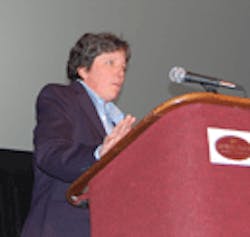Experts see steeper regulatory hurdles for trucks fleets
INDIANAPOLIS. Major changes to trucking’s regulatory landscape over the next few years will create a series of complex business challenges for fleets, affecting everything from operations to finding and keeping drivers. The biggest changes will be driven by the Federal Motor Carrier Safety Administration’s (FMCSA) new Comprehensive Safety Analysis 2010 (CSA 2010), due to go into full effect by December, and new hours of service (HOS) rules that should be unveiled in November, according to Annette Sandberg, CEO of TranSafe Consulting and the FMCSA’s Administrator from 2002 to 2006.
Speaking here at FTR Associates 2010 Transportation Conference, Sandberg said she believes – based on information she’s obtained – that the new HOS rules will reduce drive time from the current 11 hours down to 10, mandate a significant “rest break” during the work day, and change the 34-hour restart provision to 48 hours or greater.
Such a reworking of HOS rules alone would pose challenges to truckers, Sandberg pointed out, yet this is but one of nearly 40 new regulations to be put in place within the next few years , Dealing with such a massive slab of new rules in such a short time frame will significantly alter the underpinnings of the trucking industry, Sandberg stressed.
“It’s not just CSA 2010 or changes to HOS: it’s also about the new pre-employment screening procedures [PSP] that began in May 2010; new entrant regulations put in place in December 2009; EOBR [electronic onboard recorders] mandates; and new entry -evel driver training requirements due January 2011, just to name a few,” she said.
“You have to look at the regulatory ‘rippled effect’ from this broad context; if all of these come out on schedule in the next few years, they’ll have a significant impact on trucking,” Sandberg noted.
Attorney Nick DiMichael, of counsel with Transportation Thompson Hine LLP, said changes to HOS present the single biggest risk to shippers, in terms of how it will impact their supply chain operations. “This [new HOS rule] could end up being very problematic,” he noted in his presentation.
Sandberg added that these many rulemakings also impact one another in terms of their implementation timelines. For example, new HOS rules must be finalized by December 2011, according to the timetable established by FMCSA. Yet the agency also wants to finalize its EOBR mandates by mid-2012 – thus giving software makers just six months to align EOBRs with the new HOS rules.
The ability to view driver records via the Internet through the reporting requirements within the new PSP and CSA 2010 rules will also put shippers “on the hook” like never before in terms of liability for trucking accidents, warned Donald Broughton, managing director & senior transportation analyst with Avondale Partners.
“It falls under ‘negligent hiring and entrustment,’” Boughton explained. “If the driver’s record is out there available for viewing in an easy manner, shippers will be denied liability ‘cover’ in terms of saying, ‘Hey, that responsibility is on the carrier, not me,’” he said.
Sandberg noted that this “liability factor” may shift freight patterns. “Some shippers may start shifting more freight to brokers ito screen themselves further off from liability,” she said. “This is one reason why shippers need to be more involved in commenting on proposed trucking regulations, especially in terms of the impact on costs.”
About the Author
Sean Kilcarr
Editor in Chief
Sean Kilcarr is a former longtime FleetOwner senior editor who wrote for the publication from 2000 to 2018. He served as editor-in-chief from 2017 to 2018.
